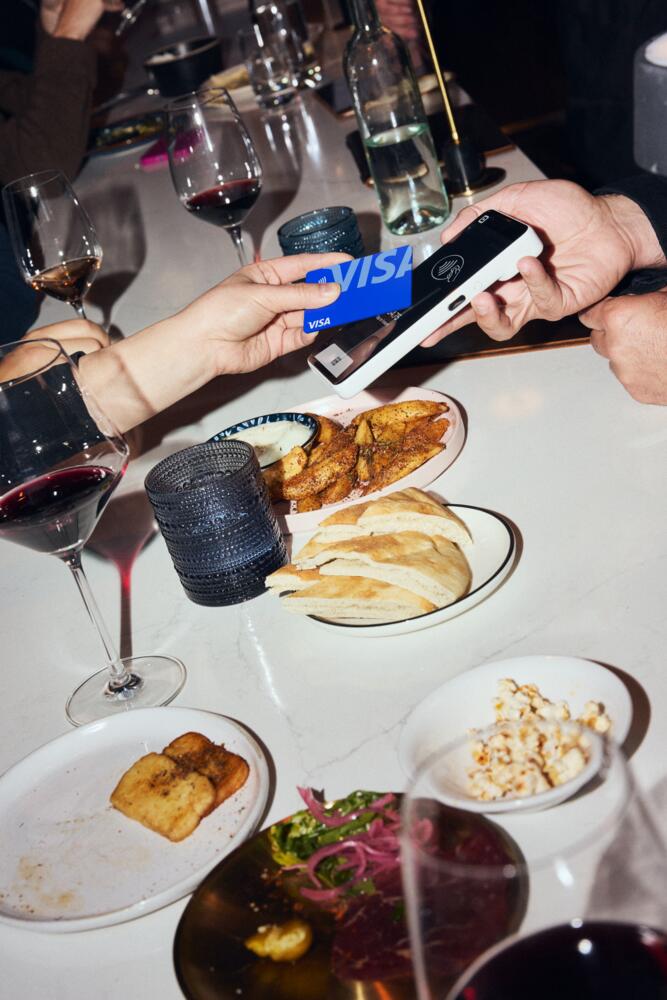Table of contents
What makes a neighborhood café feel like your place? From a remembered name to a question asked with genuine interest, those customer connections are often what set a business apart. And they cost nothing.
But as you grow, there can be tension between expanding operations and keeping the personal touch alive. How do you keep the soul of a neighborhood café when you’ve got 60+ locations? How do you offer personalized service when staff turnover is high or your store runs multiple concepts under one roof?
At the recent Square Releases event, Square sat down with the leaders behind Bluestone Lane, The Epicurean Trader, and Roaming Goat to explore those questions. These aren’t small shops anymore. Each one has expanded across locations or offerings, serving different communities with different needs. And yet, they’ve managed to stay true to the kind of service that feels one-on-one. The founders share how they use technology not to replace the human element, but to support it. Here’s how they’ve scaled their businesses without losing what made them special in the first place.
Starting with a reliable infrastructure
Nick Stone, the founder of Bluestone Lane, never set out to build a traditional coffee chain. “We don’t talk about being a coffee company or a coffee brand,” he said.
We’re very much about building communities and really being an antidote to this loneliness epidemic. Hospitality is built around making people feel good.”
Nick Stone → Founder, Bluestone Lane
However, building a hospitality-led brand at scale takes more than good culture. As Bluestone Lane grew from a single café in Midtown Manhattan to over 60 locations nationwide, they invested in reliable infrastructure — tools that work consistently across every location, every shift, and every customer interaction.
“My number one request was to have continuity at all times,” Stone said. “I’ve walked into cafes where the team is frustrated because only one point of sale (POS) works.” That kind of frustration doesn’t just create operational delays. It affects the whole experience. “Having a tech platform that enables our team to be empowered and be successful is probably the number one prerequisite to us being successful.”
For Bluestone Lane, service is local by design. “We benchmark all of our cafes that they have to be the best in the local area,” Stone explained. “What that means is they have to be ranked in the top three within a one-square-mile radius.” That level of performance isn’t possible without tools like Square that can support consistent, high-quality execution across every store.
Using technology that doesn’t get in the way

Stone believes that when technology does its job well, it fades into the background and makes space for real connection. “If tech enables my team to spend more time engaging and still have a really convenient, frictionless experience, I think it’s just going to enhance our proposition.”
Jacob Paronyan, founder of Roaming Goat, shares the same view. “For me, the most important thing is to have the technology disappear and not get in the way,” he said. “All I’ve ever really wanted is for it to just become easy, blend into the background, and not be about that.”
Roaming Goat runs a lean operation, so simplicity and adaptability matter. They’ve adopted the new Square Handheld, which tucks into an apron and can handle everything from orders to payments. “The Handheld is really the best way I’ve seen it happen,” Paronyan said. “It really takes away the technology part so that my staff can talk about this crazy wine from Armenia and serve it to a client who’s never heard of it.”
Keeping operations aligned with centralized systems
As Bluestone Lane grew into new markets Stone realized that expansion could mean complexity. “We had disparate software, providing functionality from loyalty to order,” he said. “That comes with an incredible amount of complexity and challenge. Operationally, there’s certain knowledge that can constantly creep out of your business if all you need is one person to resign and then suddenly you don’t know how it all integrates.”
This fragmentation can make it harder to train new staff, maintain consistent workflows, or stay nimble when a business needs to adapt. Today, the business runs its 60-plus locations using Square that covers its POS, team operations, loyalty, online ordering, and analytics. “What we are so excited by is this ability to have a universal solution, to basically be able to centralize, to remove some of these disparate software and bring it to one general solution, one house.” Instead of juggling tools or worrying about how systems fit together, they can manage the full business from a single source of truth.
That kind of integration smooths out back-end operations and strengthens the guest experience. With shared systems and fewer points of failure, every location is better equipped to deliver the same quality of service, no matter the location or time of day.
Customizable tech to fit local needs
The Epicurean Trader runs a mix of specialty grocery stores, cafés, and wine bars across San Francisco, and no two locations are the same. Some cater to weekday regulars who stop in for coffee and lunch. Others serve tourists looking for something unique to take home. Being able to tailor the experience based on the neighborhood is key.
“Most of our businesses are neighborhood-driven,” said co-founder Matt Pond. “But one of them, which is in the Ferry Building, is very tourist-driven. So the ability to have different product offerings and different price points…it’s really working for us.”
That kind of flexibility is only possible when the tools running the business are adaptable. With Square, The Epicurean Trader team can adjust menus, pricing, and inventory by location, while still managing everything through a single system.
Roaming Goat faced a different challenge: starting small, and then scaling up gradually. “We needed to be able to start with a small footprint,” said Paronyan. “And then as we needed to grow, we were able to then get a printer… then get another terminal and so on. So it was nice to have this modular [platform] that you could build out as the demand grew.”
That modularity Square offered also meant Roaming Goat didn’t have to overcommit early on or get locked into rigid contracts. They could test what worked and expand when it made sense. As new needs emerged, such as integrating OpenTable to better manage reservations, they could simply plug those tools into the same ecosystem. “It really makes the interaction a little bit more seamless for the guests,” Paronyan said. “But also helps us utilize tables better.”
Adapting tech around the customer experience — not the other way around — can help your business make personalized service scalable.
Building trust with personalized loyalty programs
As businesses grow, it’s easy for loyalty programs to slip into generic territory. But for brands like The Epicurean Trader and Bluestone Lane, loyalty is more than a marketing tactic, it’s a way to reinforce identity and make customers feel like they belong.
At The Epicurean Trader, that idea is playing out through both free and paid memberships. The business offers a classic cafe loyalty program which gives customers regular discounts and a $200-per-year membership program that offers perks beyond discounts.“We found it’s actually quite inspiring how many people want to support The Epicurean Trader and purchase a paid membership,” Pond said. “They feel special, and they’re rewarded.”
That kind of emotional connection is what turns a store into someone’s go-to spot and what keeps them coming back. Square’s Future of Commerce report found that 62% of consumers say a personalized experience makes them more likely to return to a business. The loyalty features built into Square allow businesses to track visits, send tailored offers, and create programs that their customers are even willing to pay for.
Stone is looking at loyalty through a similar lens. For him, personalization is the next frontier. “I think now it’s going to be so exciting, this new personalization frontier with AI,” he said. “Everyone will have their own individual loyalty program.” He envisions a system that can gamify visits, make tailored recommendations, or even suggest store locations based on a customer’s habits.
Deploying easy-to-use tools that staff love
Great service starts behind the counter. If your staff is frustrated, guests can feel it. When tools are intuitive and easy to learn, staff spend less time troubleshooting and more time focusing on people. The result is faster service, better energy, and fewer mistakes.
At Bluestone Lane, Stone saw this firsthand during their nationwide rollout of Square. “We switched 63 locations across ten markets in about four to six weeks,” he said. “And it’s been seamless.” But more importantly, the change didn’t meet resistance from his team. “The team loves it. The team has embraced the change… it’s been incredible.”
That enthusiasm matters. When tools are intuitive, staff can focus less on figuring things out and more on making guests feel welcome. And when they feel supported instead of stressed, it shows in the service.
The future of hospitality isn’t about being high-tech, it’s about being high-touch. Businesses like Bluestone Lane, The Epicurean Trader, and Roaming Goat show that smart, streamlined tools make it possible to scale while staying local, both in spirit and in service. The right technology frees them to do what they do best: make others feel at home.
![]()












